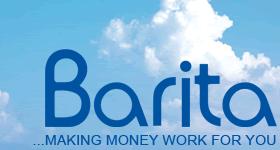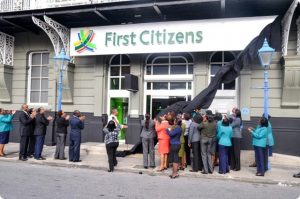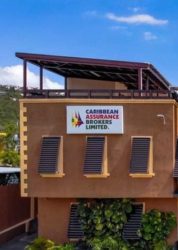The volume of stocks traded on Monday dropped 62 percent and valued 72 percent less than on Friday but closed, with declining stocks overwhelming those advancing more than two to one at the end of activity on the Junior Market of the Jamaica Stock Exchange.
 At the close, 33 securities traded, down from 37 on Friday and ended with prices of eight rising, 19 declining and six closing firm.
At the close, 33 securities traded, down from 37 on Friday and ended with prices of eight rising, 19 declining and six closing firm.
At the close, the Junior Market Index rallied 5.67 points to 3,406.40. The PE Ratio, a measure used to compute an appropriate value of a stock, averaged 13 based on ICInsider.com’s 2021-22 earnings forecast.
Trading resulted in a total of 2,922,552 shares changing hands for $8,935,750 compared to 7,615,922 units at $31,395,162 on Friday.
Future Energy Source led trading with 27 percent of total volume, after an exchange of 788,482 shares, followed by Lumber Depot 15 percent with 437,520 units and Jamaican Teas with 14.7 percent after trading 429,310 units.
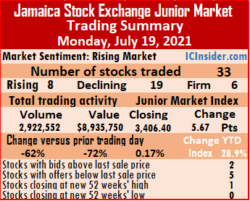 Trading for Monday averages 88,562 units at $270,780, down sharply from 205,836 at $848,518 on Friday. Trading month to date averages 166,238 units at $478,681, compared to 172,172 units at $494,563 on Friday. June closed with an average of 225,705 units at $644,459.
Trading for Monday averages 88,562 units at $270,780, down sharply from 205,836 at $848,518 on Friday. Trading month to date averages 166,238 units at $478,681, compared to 172,172 units at $494,563 on Friday. June closed with an average of 225,705 units at $644,459.
Investor’s Choice bid-offer indicator shows two stocks ending with bids higher than their last selling prices and five with lower offers.
At the close, Access Financial fell $2.04 to $20.83, with an exchange of 1,881 shares, AMG Packaging dipped 13 cents to $1.53, with 48,764 units changing hands, Blue Power advanced 18 cents to $3.71 with 19,679 stock units traded. Caribbean Assurance Brokers lost 14 cents to end at $1.91 with a transfer of 34,033 shares, Caribbean Cream declined by 10 cents to close at $6.75 with 2,981 units passing through the market, Derrimon Trading slipped 5 cents to $2.45, with an exchange of 52,823 stock units. Elite Diagnostic fell 10 cents to $3.50 with 558 stocks changing hands, Everything Fresh rose 5 cents to $1.05 with 39,129 shares traded, Fosrich slipped 7 cents to $8.05 with a transfer of 11,020 units. Future Energy Source lost 6 cents to finish at $1.64 with investors switching ownership of 788,482 stocks, iCreate declined 8 cents to 78 cents, with an exchange of 31,416 stock units, Knutsford Express jumped $1.25 to $8.40 with 25 shares changing hands. 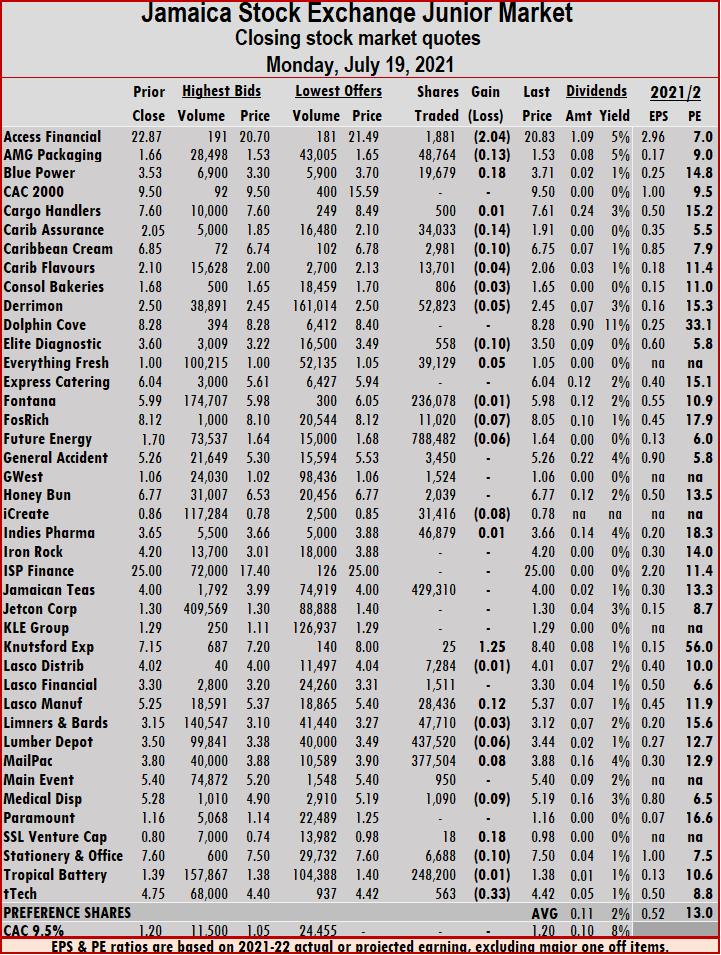 Lasco Manufacturing rallied 12 cents to $5.37 with 28,436 units traded, Lumber Depot slipped 6 cents to $3.44 with a transfer of 437,520 stock units, Mailpac Group rose 8 cents to $3.88 with 377,504 shares crossing the market. Medical Disposables lost 9 cents to close at $5.19, with 1,090 stocks changing hands, SSL Venture advanced 18 cents to close at a 52 weeks’ high of 98 cents with 18 units traded, Stationery and Office Supplies dipped 10 cents to $7.50 with a transfer of 6,688 stock units and tTech shed 33 cents to close at $4.42, with 563 shares crossing the exchange.
Lasco Manufacturing rallied 12 cents to $5.37 with 28,436 units traded, Lumber Depot slipped 6 cents to $3.44 with a transfer of 437,520 stock units, Mailpac Group rose 8 cents to $3.88 with 377,504 shares crossing the market. Medical Disposables lost 9 cents to close at $5.19, with 1,090 stocks changing hands, SSL Venture advanced 18 cents to close at a 52 weeks’ high of 98 cents with 18 units traded, Stationery and Office Supplies dipped 10 cents to $7.50 with a transfer of 6,688 stock units and tTech shed 33 cents to close at $4.42, with 563 shares crossing the exchange.
Prices of securities trading are those for the last transaction of each stock unless otherwise stated.
Volume popped for JSE USD Market on Monday
Trading on Monday ended with the USD market declining moderately, after an exchange of 677 percent more shares than for Friday, as the value of stocks traded surged 1,033 percent and ending, with more stocks rising than falling.
 Overall, 2,078,672 shares traded, for US$107,586 compared to 267,463 units at US$9,495 on Friday.
Overall, 2,078,672 shares traded, for US$107,586 compared to 267,463 units at US$9,495 on Friday.
Trading averaged 415,734 units at US$21,517, compared to 53,493 shares at US$1,899 on Friday. Trading month to date averages 136,375 units at US$10,528 in contrast to 113,476 units at US$9,627 on Friday. June ended with an average of 87,444 units for US$6,162.
Trading ended with five securities changing hands, the same number as on Friday, with prices of two stocks rising, none declining and three remaining unchanged.
The JSE USD Equity Index lost 0.93 points to end at 185.02. The PE Ratio, a measure that computes an appropriate value of a stock, averaged 12.1 based on ICInsider.com’s forecast of 2021-22 earnings.
Investor’s Choice bid-offer indicator shows one stock ended with the bid higher than the last selling price and three with lower offers.
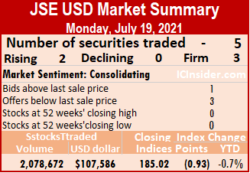 At the close, First Rock Capital traded 6,577 shares at 8 US cents, Proven Investments rose 0.7 of a cent to 24.7 US cents with investors switching ownership of 394,370 units, Sygnus Credit Investments settled at 13.99 US cents with the transfer of 2,021 stocks and Transjamaican Highway rose 0.05 of a cent to 0.80 US cents, with 1,675,649 shares crossing the exchange.
At the close, First Rock Capital traded 6,577 shares at 8 US cents, Proven Investments rose 0.7 of a cent to 24.7 US cents with investors switching ownership of 394,370 units, Sygnus Credit Investments settled at 13.99 US cents with the transfer of 2,021 stocks and Transjamaican Highway rose 0.05 of a cent to 0.80 US cents, with 1,675,649 shares crossing the exchange.
In the preference segment, JMMB Group 6% remained at US$1.10 with 55 stock units changing hands.
Prices of securities trading are those for the last transaction of each stock unless otherwise stated.
RJR profit explodes
Revenues at Radio Jamaica fell for the year to March 2021, by 7 percent to $5.2 billion, from $5.6 billion, but there ends the bad news for the group that comprises television, radio and newsprint as their main products. On the revenue front, the good news starts emerging with the final quarter climbing 11.6 percent to $1.4 billion from $1.25 billion in 2020.
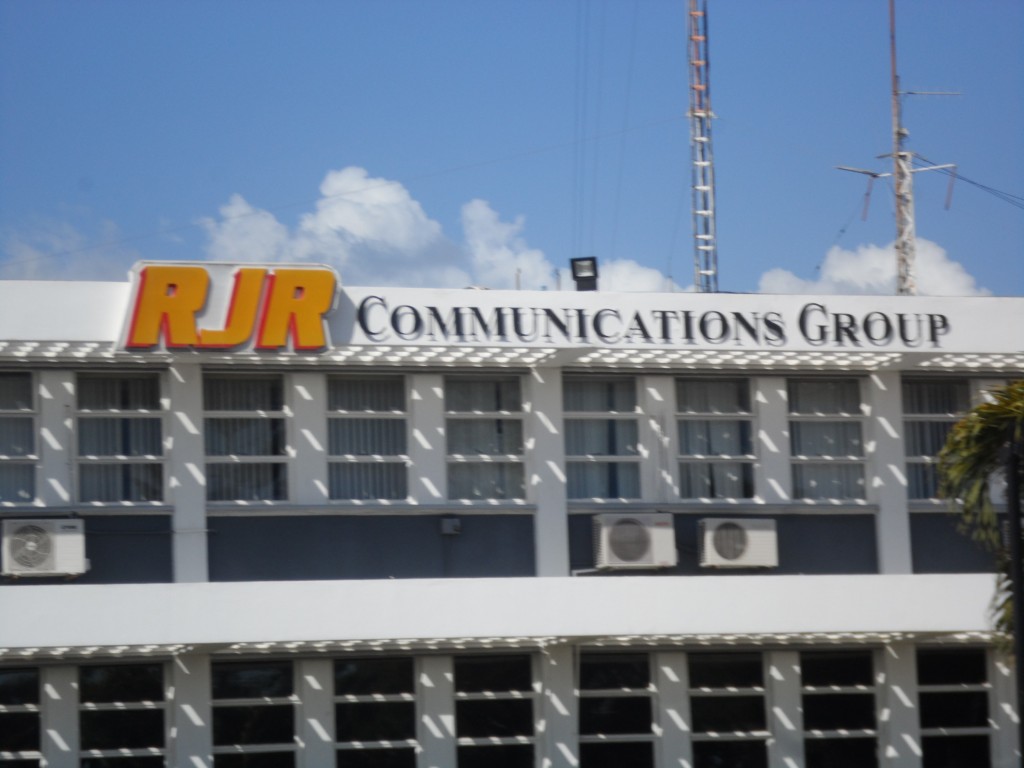
Media house, RJR traded most shares on friday
Full year profit surged 351 percent over 2020 to hit $171 million and just 7 cents per share, from $38 million in 2020. The March quarter, which is usually one of the worse for the group, with mostly ends losses, generated $44 million profit after tax.
The profit for the fourth quarter in 2021 compares exceptionally well with a loss of $156 million in the final quarter of 2019 and a loss of $96 million in 2020, March quarter. The sharp turnaround is directly attributed to the cost surgery the group underwent last year.
The year’s performance comes against the backdrop of $366 million in what can be considered one off costs in a year when revenues fell 7 percent, redundancy payment amounting to $183 million and provisions for bad debt $158 million. In addition, included in operating cost is $164 million for web development, an item that appears to be more of a capital nature than an expense, but it has been reported as an expense for some years. Importantly, redundancy costs will not repeat, at least for the same workers but critically, it will result in an annual staff cost savings of a similar amount in the future. For the past year, those workers who were made redundant would have been employed for approximately half the year, so the reduction in wages in 2021 onwards would be around $90 million. In line with the above, salaries and wages fell $365 million to $1.5 billion for the 2021 fiscal year. Some of the reductions relate to a period when staff members were on reduced pay. Inventories expensed to direct production expenses during the year amounted to $213 million, well down on the $393 million for the Group in 2020.
Segment results show television revenues growing 7 percent for the year to $2.36 billion, with the March quarter surging an attractive 23 percent to $626 million. The segment had the worse period in the fiscal year with a 2.7 percent decline in revenues for the June quarter. Operating profit from this segment blasted off from $132 million to $479 million.

RJR shareholders at the 2019 AGM at the Jamaica Pegasus
Radio suffered just a 4 percent reduction in revenues, with most of that coming in the June quarter, with a fall of 20 percent and the segment delivered an operating profit of $95 million for the year from a small loss of $4 million in 2020. For the final quarter, revenues for radio were up one percent over 2020 to $184 million.
The print division took the brunt of the hit to revenues last year, with a fall of 40 percent in the June quarter, 20 percent in the September quarter and 19 percent in the December quarter. Revenues fell 19 percent to $2.3 billion for the year but enjoyed a six percent bounce in the March quarter, putting it ahead of the 2019 revenues, but ended 2021 with an operating loss of $267 million from a small loss of $14 million in 2020. The bulk of the redundancy of 106 workers came from the print division, with a redundancy cost of $157 million. The March quarter results mark a major about turn for that division, with increased revenues, but the segment results show an increased loss in 2021 of $64 million versus $28 million in 2020; this could be due to bad debt provisions that may have been made in the final quarter.
Cash inflows for the quarter were $600 million versus $403 million in 2020, but after working capital changes, inflows slipped to $540 million, after paying $176 million on the acquisition of property and receiving loan proceeds of $132 million resulted in cash on hand growing by $426 million.
The group ended with cash and equivalent of $725 million at the end of March, up from $282 million, while borrowings stood at $528 million, up from $425 million at the end of the 2020 fiscal year. Receivables climbed to $1.2 billion from $1 billion at the end of March 2020, but allowance for impairment grew from $288 million to $395 million.
Current assets stood at $2.1 billion and current liabilities at $1 billion, resulting in net current assets of $1.1 billion. Shareholders’ equity grew to $2.5 billion from $2.3 billion as of March 2020.
ICInsider.com projects a profit of just over $970 million or 40 cents per share for the 2022 fiscal year and 55 cents per share for 2023. The stock last traded at $1.67 on the Main Market of the Jamaica Stock Exchange on Friday and trades at a PE ratio of 4, well below the average of 16 currently for the Main Market. The stock is ICInsider.com BUY RATED.
Profit doubles at Caribbean Cream for Q1
Caribbean Cream released first quarter results with revenues up a solid 28 percent to $549 million and profit doubled to $54 million after taxation of nearly $8 from $27 million after tax of $4 million with earnings of 14 cents per share.
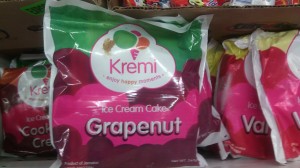
Caribbean Cream’s Kremi product
Cost of sales rose 17 percent to $341 million from $292 million in 2020. Selling and distribution costs rose 21 percent to $15 million while administrative costs rose 41 percent to $126 million, finance costs came in at $5 million. Taxation rose to $7.7 million from $4 million in 2020.
Commenting on the results for the year in a joint statement Christopher Clarke, Chairman and Carol Clarke Webster director, operating expenses rose 35 percent or 38 million due to a number of factors, higher transport cost for an increased number of deliveries of product. “Internal reclassification of electricity from production to distribution to more fairly reflect energy usage by business segments’ salary increases and other staff related costs and the full annualized cost for the Ocho Rios depot. The directors stated that they are currently carrying out capital works at the properties for operations that will lead to reduced cost of utilities.
Cash inflows for the quarter were $98 million versus $64 million in 2020, but after working capital changes, inflows rose to $117 million, $62 million was expended on the acquisition of property and resulted in cash on hand of $264 million. Current assets stood at $453 million and current liabilities at $210 million, resulting in net current assets of $243 million. Shareholders’ equity grew to $888 million from $771 million as of May 2020 and loans amounted to $324 million, of which $29 million is due to be repaid in the next twelve months.
IC Insider.com projects a profit of $320 million or 85 cents per share for the 2022 fiscal year and $1.50 per share for 2023. The stocks last traded at $6.90, after releasing the results, on the Junior Market of the Jamaica Stock Exchange, a 52 weeks’ high and the highest since October 2018. At Friday’s last traded price, the stock ended the week at a PE ratio of 8.3, well below the average of 13 currently for the Junior Market.
Trading drops on JSE USD market
Trading on Friday ended with the market rising after trading 78 percent fewer shares than on Thursday, with more stocks declining than rising on the US dollar market of the Jamaica Stock Exchange.
 Trading ended with five securities changing hands, compared to four on Thursday with prices of one stock rising, two declining and two remaining unchanged.
Trading ended with five securities changing hands, compared to four on Thursday with prices of one stock rising, two declining and two remaining unchanged.
The JSE USD Equity Index rose 1.64 points to end at 185.95.
The PE Ratio, a measure that computes an appropriate value of a stock, averages 12 based on ICInsider.com’s forecast of 2021-22 earnings.
Just 267,463 shares traded costing US$9,495 down from 1,203,958 units at US$22,523 on Thursday.
Trading averaged 53,493 units at US$1,899, compared to 300,990 shares at US$5,631 on Thursday. Trading averaged 113,476 units for the month to date at US$9,627 in contrast to 118,832 units at US$10,317 on Thursday. June ended with an average of 87,444 units for US$6,162.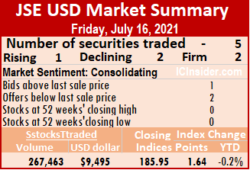
Investor’s Choice bid-offer indicator shows one stock ending with a higher bid than their last selling prices and two with lower offers.
At the close, First Rock Capital ended at 8 US cents in switching ownership of 1,850 shares, Margaritaville declined 0.18 of a cent to 9.02 US cents after exchanging 25,260 units, Proven Investments traded 450 stocks at 24 US cents. Sygnus Credit Investments lost 0.01 of a cent to end at 13.99 US cents in switching ownership of 39,903 units and Transjamaican Highway gained 0.05 of a cent ending at 0.75 US cents after exchanging 200,000 units.
Prices of securities trading are those for the last transaction of each stock unless otherwise stated.
Where are the overdue RJR financials?
The fallacy in the JSE granting extension to companies to file annual reports a month and a half after they are, without requiring them to file the interim in the meantime, is one more exposed.

RJR shareholders deserve better.
In a notice to the Jamaica Stock Exchange on June 29, Radio Jamaica advised that they were making use of the general extension being allowed for companies with the financial year ending March 31, 2021, to report their annual audited results by July 14, 2021. This extension assists the management and auditors in managing the ongoing challenges on regular business activities posed by the COVID-19 pandemic, the advice stated. At near midnight on July 15, the report is nowhere to be found on the exchanges’ website and there I no notice indicating the reason for the lateness.
Had good sense prevailed at either RJR of the JSE, investors in a major listed company would have had interim figures to digest. The JSE needs some major surgery and fast.
 Thirty seven (37) securities traded, up from 34 on Thursday and ending with 11 stocks rising, 19 declining and seven closing unchanged.
Thirty seven (37) securities traded, up from 34 on Thursday and ending with 11 stocks rising, 19 declining and seven closing unchanged. June closed with an average of 225,705 units at $644,459.
June closed with an average of 225,705 units at $644,459.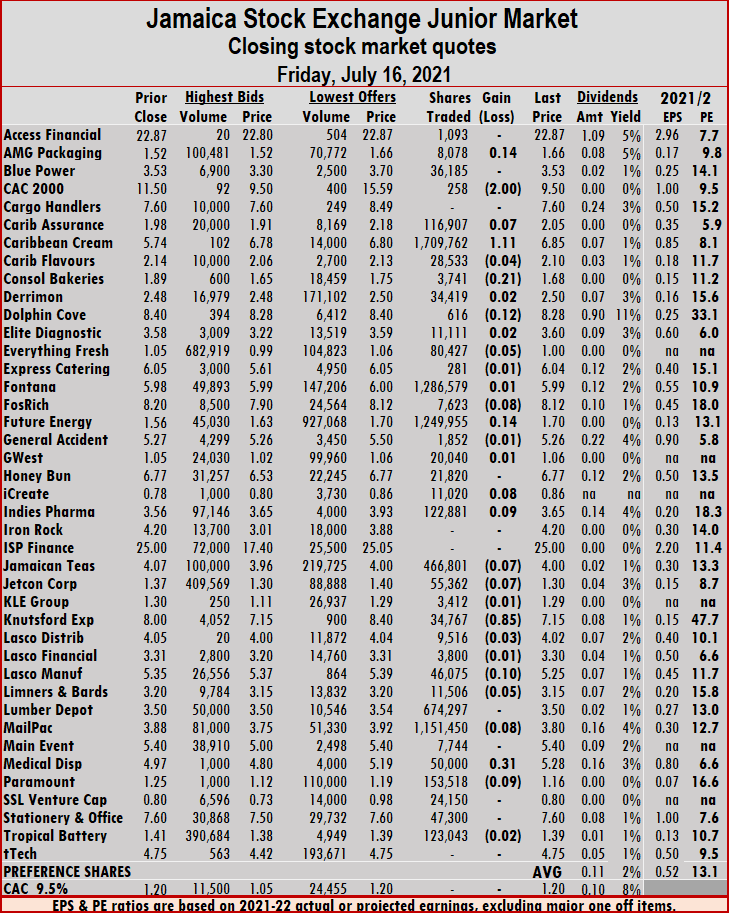 Jetcon Corporation fell 7 cents to $1.30 with 55,362 shares changing hands, Knutsford Express dropped 85 cents to $7.15 with a transfer of 34,767 units, Lasco Distributors slipped 3 cents to $4.02, in switching ownership of 9,516 stocks. Lasco Manufacturing declined by 10 cents to $5.25, with 46,075 shares changing hands, Limners and Bards lost 5 cents to settle at $3.15 with an exchange of 11,506 units, Mailpac Group dropped 8 cents to $3.80 with 1,151,450 stocks traded. Medical Disposables spiked 31 cents to $5.28, with a transfer of 50,000 stock units and Paramount Trading fell 9 cents to $1.16 with 153,518 shares crossing the exchange.
Jetcon Corporation fell 7 cents to $1.30 with 55,362 shares changing hands, Knutsford Express dropped 85 cents to $7.15 with a transfer of 34,767 units, Lasco Distributors slipped 3 cents to $4.02, in switching ownership of 9,516 stocks. Lasco Manufacturing declined by 10 cents to $5.25, with 46,075 shares changing hands, Limners and Bards lost 5 cents to settle at $3.15 with an exchange of 11,506 units, Mailpac Group dropped 8 cents to $3.80 with 1,151,450 stocks traded. Medical Disposables spiked 31 cents to $5.28, with a transfer of 50,000 stock units and Paramount Trading fell 9 cents to $1.16 with 153,518 shares crossing the exchange. At the close, the All Jamaican Composite Index fell 989.27 points to 458,112.26, the JSE Main Index shed 796.49 points to end at 420,071.66 and the JSE Financial Index dipped 0.30 points to 103.29.
At the close, the All Jamaican Composite Index fell 989.27 points to 458,112.26, the JSE Main Index shed 796.49 points to end at 420,071.66 and the JSE Financial Index dipped 0.30 points to 103.29. with lower offers.
with lower offers. Proven Investments lost 50 cents to $34.10 with an exchange of 28,310 stocks, Scotia Group fell 50 cents in closing at $39 with a transfer of 27,409 stocks, Seprod declined $1.40 to end at $70.55 in trading 2,687 units. Supreme Ventures gained 30 cents to close at $19.10 with 50,732 stocks crossing the market and Sygnus Credit Investments lost 39 cents ending at $15 with an exchange of 17,822 stock units.
Proven Investments lost 50 cents to $34.10 with an exchange of 28,310 stocks, Scotia Group fell 50 cents in closing at $39 with a transfer of 27,409 stocks, Seprod declined $1.40 to end at $70.55 in trading 2,687 units. Supreme Ventures gained 30 cents to close at $19.10 with 50,732 stocks crossing the market and Sygnus Credit Investments lost 39 cents ending at $15 with an exchange of 17,822 stock units. The All Jamaican Composite Index declined 1,348.65 points to 459,101.53, the JSE Main Index fell 1,154.18 points to end at 420,868.15 and the JSE Financial Index slipped 0.32 points to 103.59.
The All Jamaican Composite Index declined 1,348.65 points to 459,101.53, the JSE Main Index fell 1,154.18 points to end at 420,868.15 and the JSE Financial Index slipped 0.32 points to 103.59. Investor’s Choice bid-offer indicator reading has 16 stocks ending with bids higher than their last selling prices and two with lower offers.
Investor’s Choice bid-offer indicator reading has 16 stocks ending with bids higher than their last selling prices and two with lower offers. Salada Foods lost 20 cents in closing at $8 with an exchange of 71,674 stocks, Seprod rallied $2.26 to $71.95 with the swapping of 4,860 shares, Supreme Ventures lost 45 cents to close at $18.80 in trading 21,036 stocks and Sygnus Credit Investments popped 68 cents to $15.39 in switching ownership of 63,061 units.
Salada Foods lost 20 cents in closing at $8 with an exchange of 71,674 stocks, Seprod rallied $2.26 to $71.95 with the swapping of 4,860 shares, Supreme Ventures lost 45 cents to close at $18.80 in trading 21,036 stocks and Sygnus Credit Investments popped 68 cents to $15.39 in switching ownership of 63,061 units.